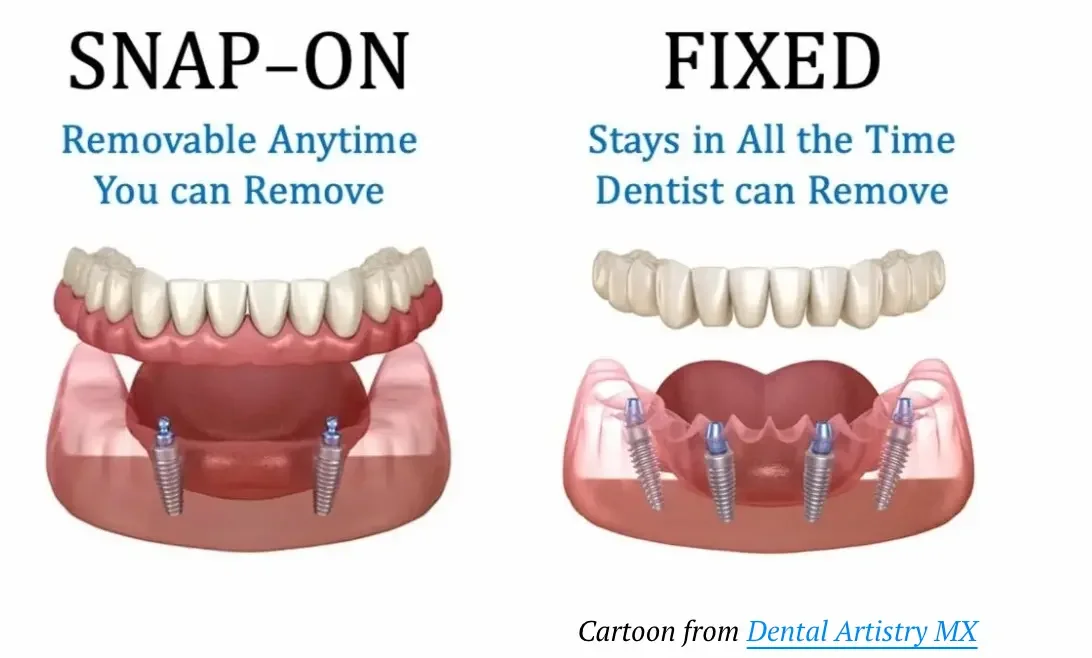Traditional vs. Snap-In vs. Fixed Implant Dentures: Which Is Right for You?
Introduction: Similar Look, Different Feel
Patients ask us all the time:
“Do I need implants to hold my dentures? Should I get snap-in dentures or fixed implant dentures?”
They all look similar — but the way they fit, feel, and function have key differences.
There are three main paths for replacing a full set of teeth:
1️⃣ Traditional (tissue-supported) dentures
2️⃣ Snap-in (implant-retained) dentures
3️⃣ Fixed implant dentures
I’ve explained in more detail what each denture option is in a separate post. But in general, each has its place. Some of our patients in St. Charles, Geneva, and Campton Hills do great with traditional, tissue-supported dentures — especially on the top arch where soft tissue support is strong. Others want the added confidence, stability, and bite strength that implants can provide, either fixed or snap-in.
If you’ve been told you “need dentures,” this guide will help you understand the real differences between each type, what daily life is like with each, and how to decide which approach fits your goals, bite, and budget. Ultimately, it’s here to help you know which is the best denture choice for you.
Quick Pros & Cons Comparison
Traditional (Tissue-Supported) Dentures
✅ Pros:
Most affordable upfront option
No surgery required
Can look very natural
Quick turnaround
⚠️ Cons:
Less stable, especially on lower jaw
Can require adhesive and frequent relines
May accelerate bone loss over time
Harder to chew tougher foods
Snap-In (Implant-Retained) Dentures
✅ Pros:
Secure, “no-slip” fit
Palate often open — better taste and speech
Easy to remove for cleaning
Lower cost than fixed options
⚠️ Cons:
Some rocking during chewing
Attachments wear out every few years
Slightly less bite force than fixed bridges
Fixed Implant Dentures (All-on-X or Hybrid Bridge)
✅ Pros:
Feels and functions like natural teeth
Maximum bite strength and stability
No movement — ever
Restores facial support and confidence
⚠️ Cons:
Highest initial investment
Requires surgery and planning
Harder to remove if hygiene neglected
Questions to Help You Decide
💬 1. Do you need full dentures on top, bottom, or both?
Top only: Any of the three options can work. The upper arch has strong tissue support, so even traditional dentures often hold well.
Bottom only: Implants are strongly recommended. Lower dentures without implants tend to move — the tissue there simply doesn’t provide suction or stability.
Both arches: Many patients choose snap-ins or fixed implants to restore chewing and confidence on both.
💬 2. Are you looking to save cost or invest long-term?
Tight budget: Traditional dentures are the most affordable starting point.
Balance of value and stability: Snap-ins offer excellent function for their cost.
Long-term comfort and lowest maintenance: Fixed implants are the best investment — fewer adjustments, better longevity, and stronger chewing efficiency.
💬 3. How important are esthetics and facial support?
High-end esthetics: Fixed zirconia dentures deliver the most natural look and facial support.
Moderate esthetics: Snap-ins can look great and are easier to adjust.
Good esthetics on a budget: Traditional dentures still provide a beautiful smile when crafted carefully.
💬 4. Do you clench or grind your teeth?
Frequent clenching/grinding: Fixed implants are strongest and distribute force best.
Light or occasional grinding: Snap-ins can work well, but may need stronger attachment materials.
Traditional dentures: Can flex or break if heavy bite force is present.
💬 5. What’s your jawbone and gum strength like?
Strong bone/tissue: Any option is possible.
Bone loss present: Implants can preserve bone and improve fit.
Severe resorption: Bone grafting or strategic implant placement may be advised first.
💬 6. Do you already have dental implants?
Existing implants: You may be able to retrofit a new snap-in denture to them.
No implants yet: Starting with a plan that allows future upgrades (from snap-in to fixed) gives flexibility and control over timing and cost.
Putting It All Together
GoalBest FitLowest initial costTraditional dentureBetter chewing without full surgerySnap-in dentureMaximum stability & estheticsFixed implant dentureUnsure where to startBegin with snap-ins, upgrade later
No two mouths are alike — that’s why every plan we make at Teuscher Legacy Dental starts with imaging, bite evaluation, and a detailed conversation about what matters most to you.
Next Step: Get Clarity Before You Commit
Not sure which way to go?
That’s exactly what our no-charge clarity call is for.
In 10 minutes, we’ll help you understand what fits your bone, bite, and budget — before you spend a dollar.
📍 Serving St. Charles, Campton Hills, Geneva, and Elburn, IL
📞 Call or text (630) 762-0000
💬 Schedule online!
Citations
Feine JS et al. The McGill Consensus Statement on Overdentures. J Prosthet Dent. 2002;88(5):354-358. PubMed PMID: 12447223
Sadowsky SJ. Mandibular Implant-Retained Overdentures: A Literature Review. J Prosthet Dent. 2001;86(5):468-473.



